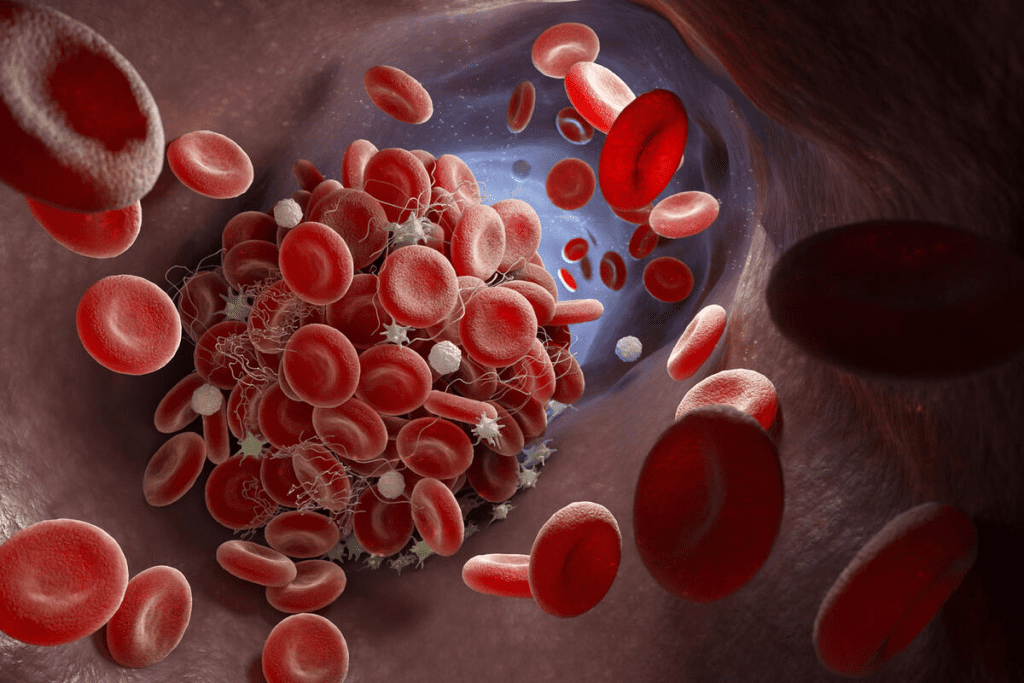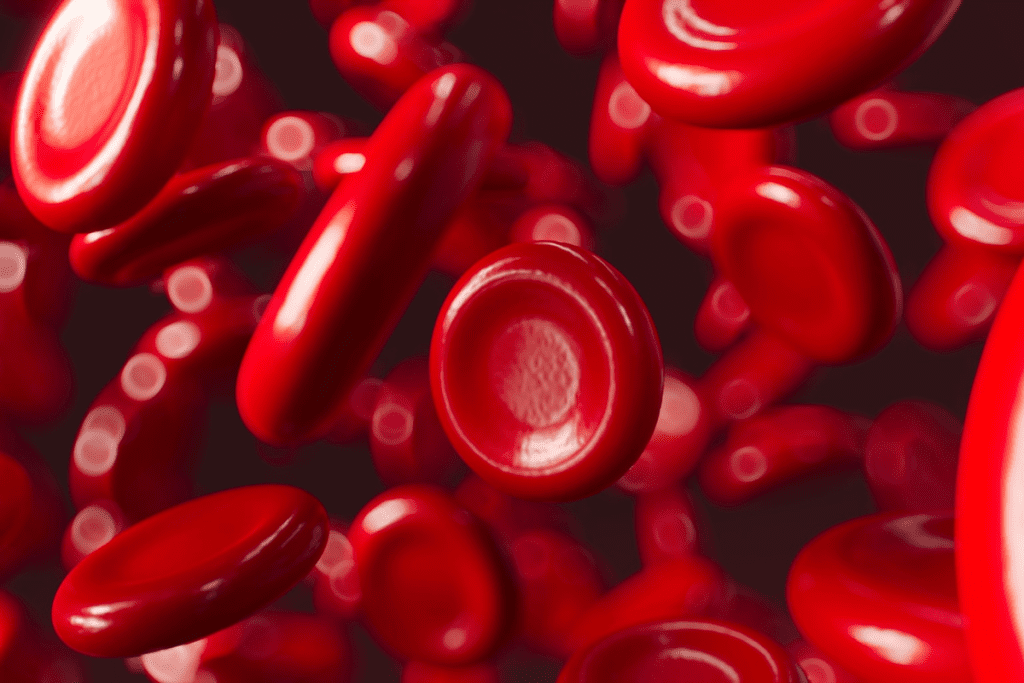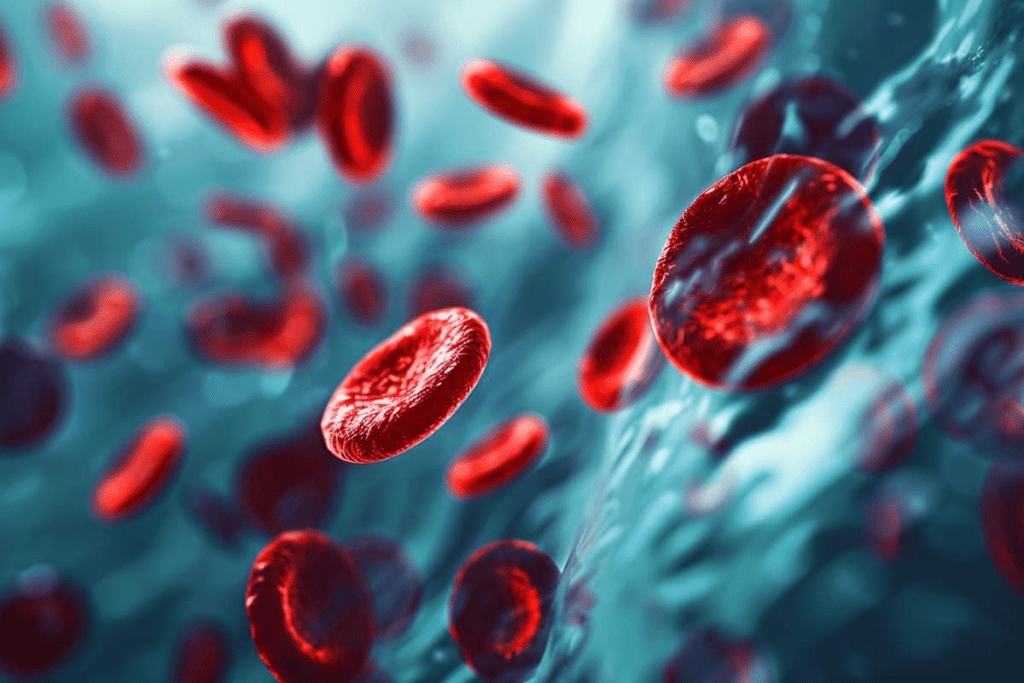Last Updated on November 13, 2025 by
Learn which vitamin and mineral deficits are the most common causes of nutritional deficiency low platelets and how diet impacts blood health.
Thrombocytopenia is a condition where you have a low platelet count. It can be caused by not getting enough important nutrients. We will look at how vitamins and minerals help keep platelet counts healthy.

Not having enough vitamin B12, folate, iron, and vitamin D can lead to thrombocytopenia. Knowing what causes and affects this condition is key to managing it well. By fixing these nutritional gaps, we can help prevent and treat low platelet count.
Platelets are vital for our health, helping to stop bleeding. They are tiny blood cells that clump and clot when a blood vessel is injured. This prevents too much bleeding.
Platelets are made in the bone marrow. They are key for blood clotting. Usually, we have 150,000 to 450,000 platelets per microliter of blood. If this number drops, it can cause thrombocytopenia.

A normal platelet count is between 150,000 and 450,000 per microliter. If it’s too low or too high, it can mean health problems. A low count can lead to bleeding, while a high count can cause blood clots.
Platelets are essential for blood clotting. When a blood vessel is injured, they stick to the injury and form a plug. This seals the break. Clotting factors in blood plasma help them form a stable clot.
Platelets and clotting factors work together to stop bleeding. Medical experts say, “Platelet activation and aggregation are key in forming arterial thrombi”.
Knowing how platelets work and what happens when their counts are low is key. We’ll explore more about platelet disorders next.
Thrombocytopenia is when you have too few platelets in your blood. This makes it hard for your blood to clot, leading to bleeding problems. It happens when you have less than 150,000 platelets per microliter of blood. Platelets are key for stopping bleeding, and not having enough can cause health issues.

Thrombocytopenia is divided into mild, moderate, and severe based on the platelet count. A mild case has 100,000 to 150,000 platelets per microliter. Severe cases have less than 50,000.
“Thrombocytopenia can result from decreased platelet production, increased platelet destruction, or splenic sequestration,” as noted in medical literature. Knowing the type helps doctors choose the right treatment.
Several things can cause thrombocytopenia, including:
Some people are more likely to get thrombocytopenia. These include:
Knowing these risk factors is key for early detection and treatment of thrombocytopenia. We stress the need for medical check-ups if you think you might have low platelets.
Adequate nutrition is key to making platelets. Not getting enough of certain nutrients can cause low platelet counts. Platelets are made in the bone marrow from stem cells. If we don’t eat right, this process can be disrupted.
Nutrition is vital for making platelets. Vitamins B12 and folate are important for DNA, which helps megakaryocytes grow. Without enough of these, platelet production can slow down.
Key nutrients for platelet production include:
Bone marrow is where platelets are made. Hematopoietic stem cells turn into megakaryocytes with the help of growth factors. The bone marrow environment is vital for this process.
Malnutrition can harm blood cell production, including platelets. Not getting enough nutrients can lower platelet counts. It can also make the bone marrow less effective at making blood cells.
The effects of malnutrition on blood cell production include:
It’s important to know how vitamin B12 affects platelet production. Vitamin B12 helps make DNA in bone marrow cells. This is key to making platelets.
Vitamin B12 is vital for making platelets. It helps DNA synthesis in megakaryocytes, the cells in bone marrow. Without enough vitamin B12, DNA synthesis is impaired. This leads to fewer platelets, known as thrombocytopenia.
Studies show that vitamin B12 deficiency can harm bone marrow. This affects not just red blood cells but also platelet production. So, vitamin B12 is key for healthy platelet counts.
Many things can cause vitamin B12 deficiency. Diet, gut disorders, and some medicines are culprits. Vegans are at higher risk because they don’t eat animal products, which have vitamin B12.
Other reasons include pernicious anemia and surgeries that mess with nutrient absorption.
Many studies have looked at vitamin B12 and thrombocytopenia. They’ve found that fixing vitamin B12 levels can boost platelet counts in those with thrombocytopenia.
A study in a top medical journal showed vitamin B12 helped patients with thrombocytopenia. It shows why treating vitamin B12 deficiency is critical for those with low platelets.
Folate, or vitamin B9, is key for DNA making and fixing. It affects how many platelets are made. We’ll look at how folate shortage impacts platelet counts and why.
Folate is vital for DNA making, which is needed for platelet creation. DNA synthesis helps megakaryocytes grow and mature. These cells make platelets. Without enough folate, DNA making is off, and platelet making drops.
The steps include:
Folate shortage can come from several sources, such as:
It’s key to find and fix these causes to avoid and treat folate shortage.
Many studies have looked into folate shortage and low platelets. They found that fixing folate levels can boost platelet counts in people with low platelets.
A study in a top medical journal showed that folate supplements greatly raised platelet counts in those with folate shortage and low platelets.
In conclusion, folate is essential for healthy platelet counts. Treating folate shortage is a big part of managing low platelets.
Iron is key for making healthy blood cells. Not having enough iron can cause low platelet counts. Keeping iron levels up is important for blood health.
Iron helps make hemoglobin, which is vital for blood cells, including platelets. Having enough iron helps platelets mature and be released from the bone marrow. Studies show iron deficiency can stop this process, leading to low platelet counts.
Iron deficiency comes from not eating enough iron, losing blood, or needing more iron during pregnancy. Some people can’t absorb iron well because of stomach problems. Knowing why people get iron deficiency helps find those at risk.
Studies have looked at iron deficiency and low platelet counts. Some say fixing iron deficiency can raise platelet counts. This shows why treating iron deficiency is key to managing low platelet counts. We’ll dive deeper into this research.
Healthcare providers can now target treatments for iron deficiency and its effects on blood. This approach is vital for helping patients with low platelet counts caused by iron deficiency.
Vitamin D deficiency is now seen as a possible cause of platelet disorders, like thrombocytopenia. It’s important to understand how nutritional deficiencies play a role in low platelet counts.
Research shows a connection between vitamin D levels and platelet function. Vitamin D receptors are found on megakaryocytes, the bone marrow cells that make platelets. This suggests vitamin D directly affects platelet production.
Vitamin D may also influence how platelets are made and work. It does this by controlling inflammation and the immune system.
Vitamin D deficiency is common worldwide. It’s caused by less sun, bad diet, and some health issues. It’s more common in places with less sunlight during some seasons.
This issue isn’t just about bones. It’s also linked to other health problems, including blood-related issues.
New studies are looking into how vitamin D affects platelet counts and function. Some research shows people with low platelets often have low vitamin D too.
More studies and trials are needed. They aim to see if vitamin D supplements can help improve platelet counts in those who are deficient.
Looking into nutritional deficiencies, we find that vitamin K, copper, zinc, and protein malnutrition affect platelet counts. While vitamins B12, folate, iron, and vitamin D are well-known for their role in platelet health, other nutrients are also important. They help keep platelet counts healthy.
Vitamin K is key to blood clotting. A lack of it can cause problems with platelet function. Though its direct effect on platelet count is not fully understood, it’s clear that vitamin K is important for blood health. Ensuring we get enough vitamin K is vital.
Copper and zinc are trace elements that are vital for our health. They help with immune function and enzyme activity. Both are linked to changes in blood cell production.
Copper deficiency can lead to lower platelet counts. Zinc deficiency affects the immune system and can indirectly lower platelet production. Eating foods rich in copper and zinc is important for healthy platelet counts.
Shellfish, nuts, and legumes are good sources of copper. Meat, dairy, and fortified cereals are good for zinc.
Protein malnutrition affects the body in many ways, including blood cell production. We need enough protein to make proteins for blood cell creation. Without enough protein, blood cell production drops, including platelets.
To fix protein malnutrition, we can change our diet or use supplements. Eating a balanced diet with plenty of protein is key for good health and blood cell production.
When patients have low platelet counts, finding the cause is key. It’s not just about treating the symptoms. We need to look deeper.
Blood tests are essential for spotting nutritional issues linked to low platelets. They check for things like vitamin B12, folate, iron, and vitamin D levels.
A complete blood count (CBC) can show how many platelets a patient has. Other tests measure vitamin and mineral levels in the blood.
Symptoms can hint at what’s causing low platelets. Patients might feel tired, weak, or have pale skin. They might also notice neurological changes.
For example, a vitamin B12 deficiency can cause numbness or tingling. This, along with low platelets, is a clear sign of a problem.
When diagnosing thrombocytopenia, we must consider many possible causes. This includes nutritional issues, bone marrow problems, medications, and diseases.
By looking at a patient’s medical history and doing physical exams, we can find the right cause. Lab tests help us narrow it down and choose the best treatment.
Effective treatment for thrombocytopenia caused by nutritional deficiencies needs a detailed plan. This plan should tackle the root causes. We will discuss the main strategies, including supplements, diet changes, and monitoring.
Supplements are key in treating thrombocytopenia due to nutritional deficiencies. Here are some strategies:
Always talk to a healthcare provider before starting supplements. They can guide the right dosage and watch for side effects.
Changing your diet is also important in treating thrombocytopenia. Here are some diet tips:
Regular checks and follow-ups are vital for managing thrombocytopenia. Here’s what we recommend:
It’s important for patients to know when to get medical help. Seek immediate help if you have:
By using a complete treatment plan that includes supplements, diet changes, and monitoring, patients can see big improvements in their condition.
Understanding the connection between nutritional deficiencies and low platelet count is key. We’ve looked at how vitamin B12, folate, iron, and vitamin D affect platelet production. These nutrients are important for preventing thrombocytopenia.
To keep platelet counts healthy, addressing these deficiencies is essential. Eating a balanced diet helps the body make platelets. Sometimes, taking vitamins and minerals is also needed, but only with a doctor’s advice.
Nutritional deficiencies are a big part of thrombocytopenia. Doctors can treat these deficiencies to help patients. They might suggest changes in diet, supplements, and regular check-ups based on each person’s needs.
By focusing on nutrition and fixing deficiencies, we can manage thrombocytopenia better. This approach not only keeps platelet counts in check but also boosts overall health.
Thrombocytopenia is when you have too few platelets in your blood. This can cause bleeding and other health problems.
Normal platelet counts are between 150,000 and 450,000 per microliter of blood.
Vitamin B12 is key to making platelets. Without enough, you might get thrombocytopenia.
Folate deficiency can happen from not eating enough folate, needing more during pregnancy, or from some medicines.
Iron is needed for platelet production. Without enough iron, you might have thrombocytopenia.
Some studies link vitamin D deficiency to thrombocytopenia. But the exact reasons are not fully understood yet.
Yes, not having enough vitamins K, copper, zinc, or protein can also lower your platelet count.
Doctors use blood tests and check your symptoms to diagnose thrombocytopenia. They also look for what might be causing it.
Treatment includes taking supplements, changing your diet, and keeping an eye on your condition. It depends on what you’re lacking.
If you bleed a lot, bruise easily, or have small spots of blood, see a doctor. They can find out why and how to fix it.
Subscribe to our e-newsletter to stay informed about the latest innovations in the world of health and exclusive offers!